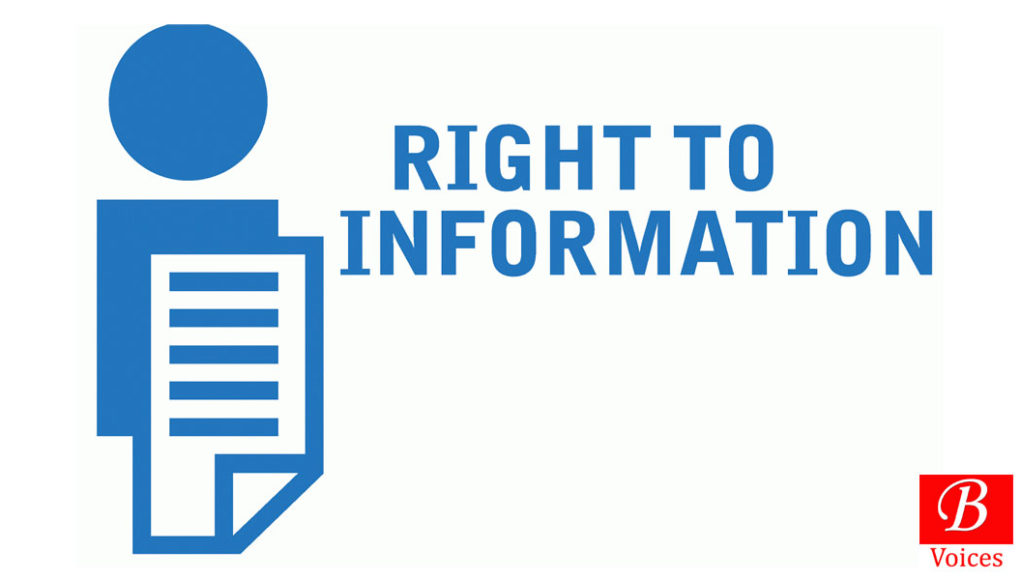Yahya Reki
Quetta: Right to Information Law is a Tool for Journalists and Empowering the Public in Balochistan. Working journalists are unable to collect accurate data in government sector which cause hurdles in their daily work.
Article 19A of Constitution of Pakistan guarantees the right to information and enables citizens to access information held by public bodies and approach government affairs, subject to reasonable restrictions imposed by law. This provision was a positive step towards enhancing transparency and empowering citizens to hold the government accountable.
Importance of RTI for Journalists:
RTI Law is a best tool for Journalists to Fact-Check during Investigative Reporting. Working Journalists can use this law to verify information, uncover discrepancies, and hold public institutions and government officials accountable.
Journalists can use it to strengthen the credibility of their reports and exposes corruption or mismanagement in various sectors. It is also helpful for general public and civil society to get information about development and public fund projects.
Access to Official Documents:
RTI not only facilitates access to reports, budgets, and other official documents, providing journalists with the raw material for in-depth stories on matters of public interest. It is helpful to promote transparency within the government, making it easier for journalists to scrutinize policies and their implementation. RTI allows citizens to actively participate in governance by seeking information on government programs, policies, and the utilization of public funds.
Pakistan was the first South Asian country to adopt a Freedom of Information Ordinance in 2002, primarily to fulfil a requirement imposed by the Asian Development Bank (ADB). However, the Freedom of Information Ordinance 2002 was considered weak and ineffective legislation in the provision of free flow of information to citizens and journalists. Afterwards, Balochistan and Sindh provinces adopted the same law in the shape of ‘Balochistan Freedom of Information Act 2005’ and the ‘Sindh Freedom of Information Act 2006’. These laws also couldn’t ensure citizens’ right of access to information. The year 2010 marked a significant turning point for democracy, as Article 19-A was inserted in the Constitution of Pakistan through the 18th Amendment. Article 19-A[1] recognizes the fundamental right of access to information.
Balochistan RTI Law:
Balochistan government has passed the Right to Information Act in 2021. Rules and regulations of this Act were approved by the provincial cabinet on 28th December, 2022 chaired by former Chief Minister Balochistan Abdul Quddus Bizenjo. Due to hurdles its effectiveness is hampered by several challenges. The law hasn’t been fully implemented, with delays in establishing Information Commissions and designated officers. The government officials are making hurdle and show resistance to disclose information, hindering transparency.
On the other side people of Balochistan don’t have awareness about RTI law and it remains low, limiting its utilization by citizens.
Despite the challenges, the RTI Law holds immense potential for Balochistan. Strengthening its implementation through Public awareness campaigns to educate citizens about their right to information. Capacity building for government officials on RTI procedures, Establishment of a functional Information Commission to address grievances and ensure timely information access.
An effective RTI law not only empowers journalists, it will foster a more informed citizenry and ultimately contribute to better governance in Balochistan.
Journalist and President Press Club Quetta Abdul Khaliq Rind said that, after long time struggle of Journalists and civil society the government has passed RTI Law in Balochistan. Unfortunately it is still in pending due to no appointment of Information Commission. Working journalists are facing hurdles to get the accurate data but it is not possible for anyone to stop news from publishing.
He added that, the law was made to responsible every government official and resolves public issues easily. But it is still in pending and goal is not achieved due to slow process from concerned quarters. Working Journalists are compelled to collect Data and news through their personal sources. But it is difficult to get the government version for news reports. RTI law is an easy way to make responsible everyone government official.
Abdul Shakoor General Secretary Balochistan Union of Journalists said that, without an effective Right to Information (RTI) law, journalists in Balochistan province face numerous hurdles in accessing information. They may encounter bureaucratic barriers, lack of transparency, delaying tactics and even intimidation from authorities reluctant to disclose information.
He added that, the slow implementation process of RTI laws in Balochistan could be attributed to various factors such as lack of political will, bureaucratic resistance, insufficient resources, and limited public awareness about the importance of transparency and accountability within the government departments. Given that RTI ensures transparency and accountability, those at the helm of affairs don’t want the law be implemented.
The Balochistan Union of Journalists, can play a crucial role in advocating for the effective implementation of RTI law by engaging with concerned authorities including government, Parliament and bureaucracy through awareness campaigns, lobbying efforts, and legal advocacy. They can also provide training and support to journalists on how to use RTI mechanisms effectively to access information.
According to an assessment report released by AID Balochistan, to assess the implementation of the Balochistan RTI Act 2021, a total of 15 information requests were filed by members of the Public Accountability Forum (PAF) to measure the response rate of public bodies. According to section 11 of the Act, the public bodies of the Balochistan government are legally obligated to provide the requested information within fifteen (15) working days. This practice reflects the response rate of the specific public bodies from which the PAF members sought information. The selection of public bodies was based on the designated Public Information Officers (PIOs) and key entities of the provincial government. It was observed that many public officials were unaware of their responsibilities under the Act and appeared hesitant to provide the requested information in response to the information requests.
The assessment report reveals that, Repelling the Balochistan Freedom of Information Act 2005 with The Balochistan Right to Information Act 2021 is a step forward in provision of information but it still lacks international and regional best practices. Despite more than two years having passed since the enactment of the Act, public bodies are still failing to proactively provide the majority of the required information, as mandated by section 5 of the Act. A bureaucratic mind-set, a culture of secrecy, and inadequate resources (financial, legal, and administrative) are major challenges. The oversight mechanism is currently dormant because the establishment of the Balochistan Information Commission and the designation of Public Information Officers, which were supposed to be completed within 120 days from the commencement of the Act, are still pending. The proactive disclosure of information through websites is not adhered to as required by section 5 of the Act. Many public bodies do not have functional websites, and the few departments that do have websites only provide basic information instead of complete and regularly updated information. The provincial government has not taken steps regarding the awareness about Balochistan RTI Act 2021.
Flaws in the Balochistan RTI:
There are multiple flaws in the Balochistan RTI Act 2021, which need to be fixed in the light of regional and international best practices and the requirements of Article 19A of the Constitution of Pakistan.
It requires submitting a copy of the Computerized National Identity Card (CNIC) while submitting an information request, which is burdensome for a common citizen. Furthermore, the applicant to state a reason for requesting information, which is against local, regional and international best practices.
There is no such requirement in the laws of Punjab, Sindh and KP or at the federal level. This requirement has no useful purpose but, instead, may become an excuse on the part of ill-intentioned officers to question the given reasons, delay disclosure and harass applicants.
The requirements of providing a CNIC and stating the reason for obtaining information were the major stumbling blocks in the FOI Ordinance 2002 and the repealed Balochistan Freedom of Information Act 2005. That was the reason, citizens, civil society and journalists demanded effective legislation.
The implementation of these laws faces significant challenges, evident in the failure to establish the Balochistan Information Commission within the stipulated 120-day timeframe.
It is imperative that public bodies prioritize proactive disclosure of information through their websites, relieving the burden on public information officers (PIOs) and streamlining the processing of information requests. Relevant authorities must address these critical challenges to ensure the effective implementation of these laws and overcome the obstacles that hinder access to information.
In order to truly establish an effective right to information regime in Pakistan, prompt action is required to rectify the identified flaws and gaps in existing legislation. Meanwhile, parliamentary oversight should be enforced effectively.
By improving implementation mechanisms and enforcing these laws, Pakistan can cultivate a transparent, accountable and participatory governance system, hopefully fostering a brighter and more inclusive future for the nation.
Disclaimer: Views expressed in this article are those of the writer and Balochistan Voices does not necessarily agree with them.
Share your comments!








